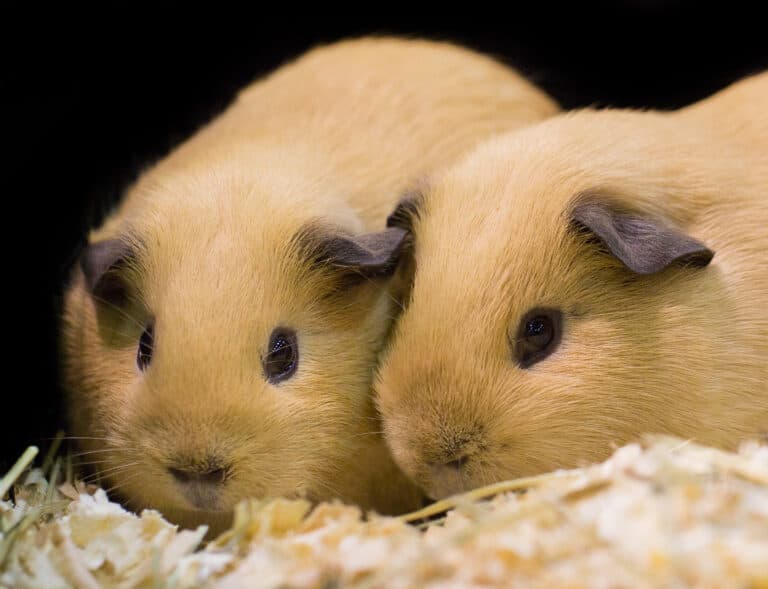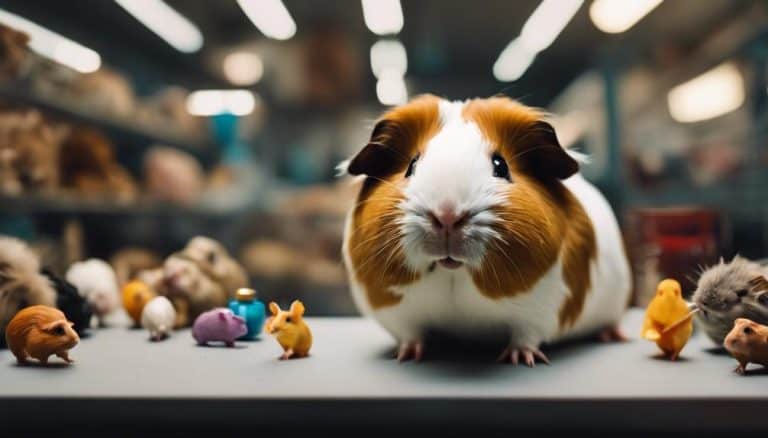Guinea Pigs: A Nocturnal Guide for Piggy Parents
As we dip our toes into the world of guinea pigs, navigating their nocturnal tendencies can feel like unraveling a mystery. These adorable creatures, with their intriguing sleep habits, hold many secrets waiting to be uncovered.
From deciphering their crepuscular rhythms to creating the ideal sleep sanctuary, there’s a wealth of knowledge to explore in ensuring our piggies’ nighttime well-being. But what if there’s more to their nighttime behaviors than meets the eye?
Discover the fascinating realm of guinea pig slumber and unlock the door to a deeper connection with your furry companions.
Understanding Guinea Pigs’ Nocturnal Nature
In understanding guinea pigs’ nocturnal nature, it’s essential to recognize that they’re crepuscular animals, not truly nocturnal. This distinction is crucial as crepuscular creatures are most active during the twilight hours of dawn and dusk.
Guinea pigs’ sleep patterns are intriguing, influenced by their natural instincts. These adorable pets only require around 4 hours of sleep per day. Unlike humans who’ve consolidated sleep, guinea pigs take short naps throughout the day and night.
Their irregular sleeping habits stem from the need to stay alert in the wild, where they must remain vigilant against potential predators. This behavior has persisted even in domesticated settings.
As piggy parents, understanding the unique sleep needs of guinea pigs can help create a conducive environment for their rest. Providing a comfortable and safe space for them to nap during their active periods is essential for their overall well-being.
Guinea Pig Sleep Patterns Demystified
Exploring guinea pig sleep patterns reveals fascinating insights into their unique behavior and natural instincts. When it comes to pig sleep, there are some intriguing facts to consider:
- Crepuscular Creatures: Guinea pigs are crepuscular animals, which means they’re most active during dawn and dusk, explaining their sporadic sleep patterns.
- Minimal Sleep Requirements: These adorable pets only need approximately four hours of sleep per day, preferring short naps throughout both day and night.
- Unusual Sleeping Habits: Guinea pigs may doze with their eyes open, and it’s not uncommon to find them napping while standing up, showcasing their adaptability.
- Age and Sleep Needs: Older guinea pigs may require more sleep compared to their younger counterparts, emphasizing the importance of understanding individual needs.
These insights into guinea pig sleep behaviors can help piggy parents better comprehend and cater to their furry friends’ rest requirements.
Tips for Creating a Sleep-Friendly Environment

Having insight into guinea pig sleep patterns, we can now focus on practical tips for establishing a sleep-friendly environment for your furry companion. Pay attention to providing a cozy hideout or shelter within the cage where your guinea pig can sleep undisturbed. This space should be comfortable and secluded to promote a sense of security during rest. Maintaining a consistent routine for feeding and playtime is crucial for regulating your guinea pig’s sleep patterns. Guinea pigs thrive on predictability, so sticking to a schedule can help them feel secure and relaxed when it’s time to rest.
Additionally, ensure the cage is placed in a quiet area away from loud noises to create a peaceful sleep environment. Using soft and comfortable bedding like hay or fleece can help keep your guinea pig warm and cozy during sleep. Monitor the room temperature regularly to ensure it’s suitable for your guinea pig’s comfort while resting. By implementing these tips, you can help your guinea pig enjoy restful and rejuvenating sleep.
Nighttime Activities for Happy Piggies
During the night, guinea pigs benefit from engaging in safe and stimulating activities to keep them mentally active and content. Here are some good ideas to ensure your piggies have a fun nighttime routine:
- Quiet Play Area: Set up a designated space with tunnels, hideouts, and chew toys for exploration.
- Interactive Toys: Provide treat balls or puzzle feeders to promote physical activity and foraging behavior.
- Variety is Key: Rotate toys and activities regularly to prevent boredom and keep your guinea pigs entertained.
- Avoid Disruptions: Steer clear of loud or bright toys that might disturb your pets’ natural sleep patterns.
Troubleshooting Common Nighttime Issues

To address any nighttime issues that may arise with your guinea pigs, it’s crucial to create a conducive environment that supports their natural behaviors and promotes restful sleep. Guinea pigs sleep best in a quiet and dark setting, mimicking their natural habitat. Consider using a red night light in their enclosure to minimize disturbances while allowing you to check on them discreetly.
Monitoring your guinea pig’s nighttime behavior is essential to spot signs of stress or discomfort, such as excessive vocalization or restless movements. Avoid sudden loud noises or bright lights during the night, as these can startle and disrupt their sleep patterns. If your guinea pig consistently struggles with nighttime issues, consulting with a veterinarian is advisable to rule out any underlying health concerns.
Conclusion
In conclusion, by understanding guinea pigs’ unique sleep patterns and creating a sleep-friendly environment, piggy parents can ensure their beloved pets enjoy restful nights and overall well-being.
Paying attention to signs of fatigue and addressing any nighttime issues promptly can help maintain a healthy and happy relationship with our furry friends.
Remember, a little knowledge and care go a long way in providing the best possible sleep experience for our nocturnal guinea pigs.







